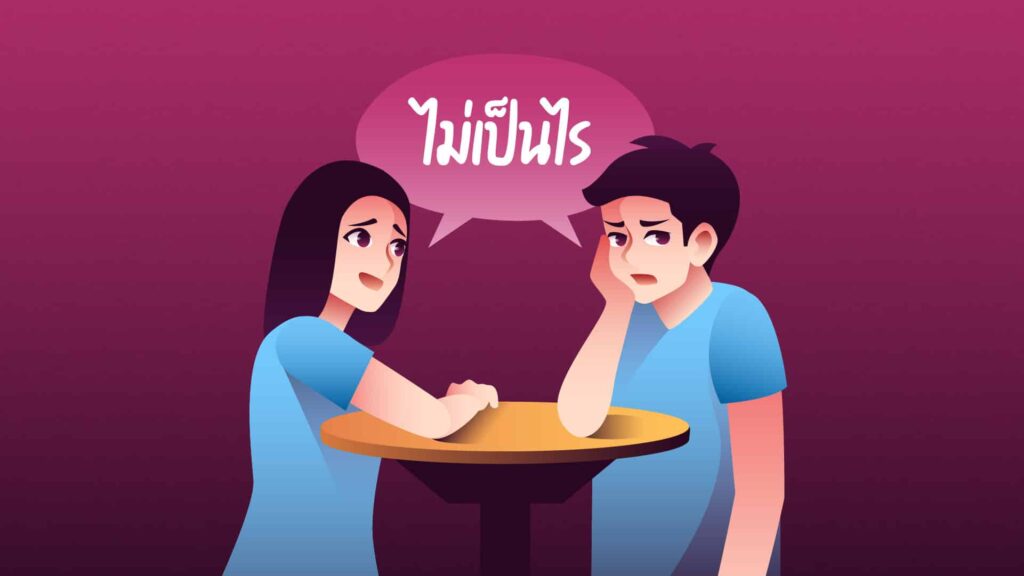If you’ve already spent some time in Thailand, you’ve likely encountered the phrase mai pen rai. It’s one of the most common expressions in everyday Thai conversation, used in all sorts of situations, from casual to serious moments. More than just a polite response or a convenient phrase, mai pen rai reflects a cultural outlook and a Thai way of navigating life. This article will explore the meaning, values, and social functions of this magical phrase, offering insight into how it captures the essence of Thai character and communication.

Photo Credit : thislifeoftravel.com
What does “mai pen rai” literally mean?
Let’s break it down word by word. The phrase consists of three parts: 1) Mai (ไม่) = no / not, 2) Pen (เป็น) = to be (is/am/are), and 3) Rai (ไร) = anything / matter. Literally translated, it means “It’s nothing.” But in practice, it carries a much broader range of meanings, including “Don’t worry about it,” “No problem,” “No biggie,” “It doesn’t hurt,” “Forget it,” “Never mind,” or “I don’t want it.”
The tone can be neutral, reassuring, dismissive, light-hearted, or even sarcastic. Because of its many nuances, mai pen rai can be both useful and complex. To use it well, and avoid unintentional faux pas, it’s important to understand the cultural mindset behind it and the variety of situations in which it may be uttered.

Photo Credit : missiontothemoon.co
Everyday use of mai pen rai
The simple but not always easy rule of thumb is this: whenever you use mai pen rai in conversation, the situation should generally involve something that can be let go and not worth emotional weight. Even if it’s said with a touch of sarcasm, the surface meaning must still imply dismissal or acceptance. Let’s look at some everyday examples where mai pen rai is used to convey a positive or neutral response.
1. To respond to apologies
Imagine you’re standing in a crowded BTS skytrain, holding the handrail. The train suddenly brakes, and someone accidentally steps on your foot. She quickly turns around and apologizes. Sensing that it was unintentional and hearing the sincerity in her voice, you respond with a smile: “mai pen rai khrap/kha.” (No big deal.) It’s a polite way to let her know all is forgiven.

Photo Credit : freepik.com
2. To decline help or trouble
Still on the skytrain, this time you’re carrying a medium-sized shopping bag in one hand while holding the rail with the other. A kind passenger offers you his seat. Grateful but also aware that your stop is just two stops away, you smile and say, “mai pen rai krub. Thank you very much.” (polite affirmation for male speakers) “mai pen rai kha. Thank you very much.” (polite affirmation for female speakers). In this context, mai pen rai politely declines the offer without diminishing the other person’s goodwill, almost like “Don’t worry!”

Photo Credit : This picture generated by ChatGPT AI
3. To let go of a small inconvenience or mistake
You go to your usual lunch spot and order stir-fried pork with basil (phad kra phow). But due to a rush of customers, the vendor mistakenly brings you stir-fried chicken instead of pork. She’s clearly flustered and offers to fix it right away. But since you’re okay with chicken, you gently say, “mai pen rai” and accept the meal. It’s your way of easing her anxiety over a small mistake and showing understanding.

Photo Credit : scb.co.th
4. To abandon an issue or give up on it
You’ve probably been there, explaining how to use a piece of equipment to a coworker and he doesn’t get it. You explain it three times, but he still can’t seem to get it. So, you say “mai pen rai” and stop explaining before proceeding to do it yourself while asking him to watch and learn. Or you might be the one receiving a rather confusing explanation. You might say, “mai pen rai,” and ask someone else for help. In this case, the phrase conveys the meaning of “Never mind that.” and signals a letting go of the effort, perhaps out of kindness or understanding.

Photo Credit : forbes.com
Cultural values embedded in “mai pen rai”
In Thai culture, mai pen rai is a common phrase, woven into our social DNA. At its core lies the value of peace of mind. When problems arise, the typical Thai response leans toward forgiveness and tolerance rather than escalating tensions through confrontation or blame. We often choose to let go of anger and seek alternative solutions. This mindset reflects a cultural preference for conflict avoidance, not out of fear, but as a deliberate effort to maintain harmony and protect the emotional well-being of everyone involved.
Closely tied to this is the concept of face-saving. In Thai society, saying mai pen rai in moments of friction helps de-escalate tension, allowing both parties, mainly the one at fault, to cool down, drop their defenses, and become more open and cooperative to resolving the issue. It’s a powerful tool for emotional diplomacy.

helps de-escalate tension
Photo Credit : wallstreetenglish.in.th
Buddhism also plays a vital role in shaping the worldview behind mai pen rai, particularly through the principles of non-attachment and impermanence. Whether the issue is trivial or profound, many Thais understand that nothing is permanent. No joy, no sorrow, no mistake lasts forever. The sooner one lets go, the sooner peace returns.
Ultimately, mai pen rai embodies the Thai spirit of resilience and acceptance. When life throws us lemons, and nothing can be done to make them less sour, we endure with grace. Things may go wrong, but in the Thai way of thinking, it’s mai pen rai. (We’ll be ok.)

(No worries. We’ll be ok.)
Photo Credit : enlighten.co.th
Complications you may encounter with “mai pen rai” as a foreigner
The universally laid-back phrase mai pen rai can be easily misunderstood, mostly by those unfamiliar with Thai communication style. To the untrained ear, it may sound like apathy or indifference, but in most cases, that’s not the intent. When a Thai person says mai pen rai to you, they’re often expressing compassion. They don’t want you to carry the emotional burden of a problem or conflict. However, this doesn’t mean you should simply brush it off and avoid reflection. At the very least, mai pen rai offers the gift of forgiveness.

Photo Credit : เรียนอังกฤษออนไลน์.com
As mentioned earlier, the true meaning of mai pen rai depends heavily on context. Due to the indirect nature of Thai communication, it can serve many purposes: acceptance, rejection, peace, or masked irritation. This becomes even more complicated in the digital age, where tone and nuance are lost in text, leaving room for misinterpretation.
There are also cultural gray areas where mai pen rai may cause confusion. Take punctuality, for example. You might hear that Thai people are relaxed about time. It’s true that while there’s a cultural tendency toward flexibility, it doesn’t mean punctuality is unimportant. Thais do value being on time, but when someone is late, others might respond with mai pen rai to ease the discomfort, not because lateness is acceptable.
A similar tension can arise between flexibility and firmness. You may come across the term yuan yuan (หยวนๆ), meaning “to go easy” or “to compromise,” often linked with mai pen rai. But this doesn’t imply that everything is negotiable. Thais know when a situation calls for seriousness and when leniency is appropriate. Mai pen rai isn’t about ignoring what matters; it’s about knowing when to hold on and when to let go, especially when a problem cannot be fixed.

may cause confusion
Photo Credit : marketingoops.com
Tips for Foreigners
So, how should we avoid missteps with mai pen rai? The key lies in sincerity.
Use mai pen rai when you :
1. Genuinely feel that a mistake is not a big deal, and you want to reassure the person who has committed that mistake. It’s a way to say, “It’s okay, let’s move on.”

Photo Credit : unlockmen.com
2. Want to be kind to yourself. Yes, you can also say it to ease your mind when things don’t go your way and there’s no use in dwelling on the negative.

Photo Credit : trueblog.info
Avoid using mai pen rai
Avoid using mai pen rai in a sarcastic or dismissive tone because it will come across as passive-aggressive, which may confuse or even hurt others’ feelings.
How should you respond when someone says it to you? If you’ve made a mistake and someone replies with mai pen rai, a respectful response would be a simple “Khop khun krub” or “Khop khun kha” (Thank you.) followed by an apology. If you’re both facing the same challenge or difficulty, you can reflect the sentiment back as a mutual show of empathy.

instead of using “mai pen rai”
Photo Credit : shutterstock.com
Keep in mind that Thai is a high-context language, where meaning often depends more on tone, facial expression, and situation than on the literal words. This makes “reading the room” one of the biggest challenges. Learning to pick up the nuances of the phrase requires attention and cultural sensitivity. But when in doubt, let your sincerity guide you. If your intention is genuine, your use of the phrase will likely be received with warmth and understanding.

Photo Credit : professional-one.com
Conclusion
At its core, mai pen rai reflects a way of being in Thai culture. It is not about apathy, laziness, or brushing things off without care. Rather, it embodies emotional resilience, mutual understanding, and a commitment to harmony over conflict.
For those learning to live in or understand Thai society, embracing mai pen rai is more than about picking up a useful phrase but about stepping into a worldview where kindness, flexibility, and emotional balance matter. Learning to say mai pen rai sincerely and appropriately, you will be able to tune into the quiet strength of Thai emotional intelligence and the graceful art of letting go.
The story of mai pen rai is a ubiquitous yet profound aspect of Thai culture and heritage. It reflects compassion, letting go, and respect for social harmony in everyday life. Join us as we continue to explore more stories from across Thailand and discover the rich diversity that shapes Thainess.
Sources :
- https://www.travelfish.org/beginners_detail/thailand/91
- https://www.hanshin-neji.com/en/content/5567/maipenrai
- https://www.thaizer.com/mai-pen-rai-means-never-mind/

Author: Soonyata Mianlamai
Editor: Tayud Mongkolrat
Uploaded on 1 October 2025

